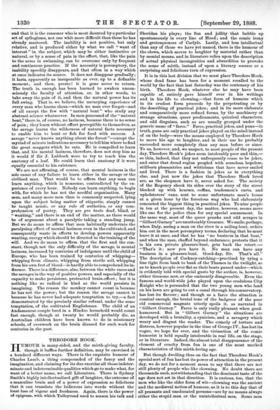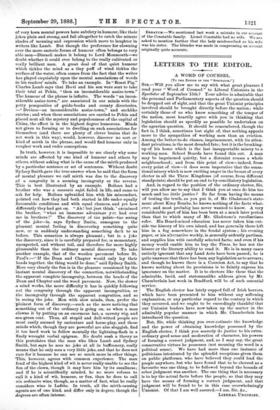THEODORE HOOK.
HUMOUR is many-sided, and the mirth-giving faculty, though it baffles further definition, may be exercised in a hundred different ways. There is the exquisite humour of Charles Lamb, a thing compounded of the fancy and the imagination, and claiming for its due exercise all those indeter- minate and indeterminable qualities which go to make what, for want of a better name, we call Literature. There is Sydney Smith's highly intellectualised gift of laughter, the outcome of a masculine brain and of a power of expression so felicitous that it can translate the ludicrous into words without the least loss of vigour and freshness. Again, there is the power of epigram, with which Talleyrand used to season his talk and
Sheridan his plays; the fun and jollity that babble up spontaneously in every line of Hood ; and the comic irony and grotesqueness of Carlyle. Lastly, and less intellectual than any of those we have yet named, there is the humour of the clown, which moves to laughter by material rather than by mental means, and in literature relies upon the description of actual physical incongruities and absurdities to provoke the sense of mirth, instead of upon a literary nuance or a surprising and felicitous turn of expression.
It is in this last division that we must place Theodore Hook, whose dead fame has been for a moment recalled to the world by the fact that last Saturday was the centenary of his birth. Theodore Hook, whatever else he may have been capable of, entirely gave himself over in his writings and in his life to clowning,—that form of humour which in its crudest form proceeds by the perpetrating or by the describing of practical jokes ; and in its more elaborate and comparatively more refined forms, by the machinery of strange situations, queer predicaments, quizzical characters, and odd disguises, such as are usually grouped under the generic name of "farce." Farce, practical jokes, and puns—in truth, puns are only practical jokes played on the mind instead of on the body—were the means employed by Theodore Hook to move his age to laughter, and in their use he probably succeeded more completely than any man before or since. To us, however, and, we suspect, to most people of the present day, Theodore Hook's jokes seem intolerably poor and thin,— so thin, indeed, that they not unfrequently cease to be jokes, and enter that dread region peopled with senseless, hopeless, stillborn pleasantries and witticisms that have never smiled and lived. There is a fashion in jokes as in everything else, and just now the jokes that Theodore Hook loved are, as the shopmen have it, never asked for. The society of the Regency shook its sides over the story of the street blocked up with hearses, coffins, tradesmen's carts, and upholsterers' vans, sent to some unfortunate man's house at a given hour by the ferocious wag who had elaborately concocted the biggest thing in practical jokes. To nine people in ten at the present day, the matter, however, seems more like one for the police than for any special amusement. In the same way, most of the queer pranks and odd scrapes in "Gilbert Gurney" are unutterably tiresome. We smile, perhaps, when Daly, seeing a man on the river in a sailing-boat, orders him out in the most peremptory terms, declaring that he must leave it at once, and that he has " no business in that boat," and when the man, chaffed beyond endurance, protests that it is his own private pleasure-boat, gets back the retort :- " That's it : now you have it. No man can have any business in a pleasure-boat. Good-day, Sir. That's all." The description of Cockney-catching—practised by tying a line tight from bank to bank of the Thames in the twilight, so as to knock people over flat as their boats passed under—which is evidently told with special gusto by the author, is, however, either tiresome now, or else eminently disagreeable. Even the famous and world-wide joke played upon the credulous City Knight who is persuaded that the two young men who land on his lawn are going to cut a canal through his conservatory, has lost its flavour ; and though as a farce the situation is comical enough, the brutal tone of the badgerer of the poor old commercial magnate utterly spoils it, as narrated in " Gilbert Gurney." Farce is only really pleasant when good- humoured. But in " Gilbert Gurney" the situations are developed with a brutality, a cynicism, and a savagery which weary and disgust the reader. The comedy of torture and distress, however popular in the time of George IV., has lost its vogue, we hope for ever, and the vivisection of the comic humorist is held equally intolerable in real life, on the stage, or in literature. Indeed, the almost total disappearance of the element of cruelty from fun is one of the most marked characteristics of this mirth-loving age.
But though dwelling thus on the fact that Theodore Hook's special sort of fun has lost its power of attraction in the present day, we do not for a moment mean to say that there are not still plenty of people who like clowning. No doubt there are thousands such, notwithstanding that the dominant taste of the age does not set in that direction. It is curious, too, that the men who like the older form of wit—clowning was the ancient and the mediaeval notion of humour, as it is to this day that of all peasants and uneducated persons—are by no means always either the stupid men or the unintellectual men. Some men of very keen mental powers hate subtlety in humour, like their jokes plain and strong, and fail altogether to catch the minute shades of meaning and expression which move to laughter in writers like Lamb. But though the preference for clowning over the more esoteric forms of humour often belongs to very able men—Disraeli makes it belong to Lord Monmouth—we doubt whether it could ever belong to the really cultivated or really brilliant man A great deal of that quiet humour which tickles the mind as a tiny puff of wind tickles the surface of the water, often comes from the fact that the writer has played exquisitely upon the mental associations of words in his readers' minds. To take an example. In " Roast Pig," Charles Lamb says that Ho-ti and his son were sent to take their trial at Pekin, " then an inconsiderable assize-town." The humour of the phrase is infinite. The words " an incon- siderable assize-town," are associated in our minds with the petty pomposities of guide-books and county directories, —" Devizes—an inconsiderable assize-town," and suchlike entries ; and when these associations are carried to Pekin and placed next all the mystery and populousness of the capital of China, the effect is in the highest degree humorous. Minds not given to forming or to dwelling on such associations for themselves (and there are plenty of clever brains that do not work in this way), would, however, discover no sort or kind of mirth in the phrase, and would find humour Only in rougher work and ruder conceptions.
In truth, however, it is impossible to see clearly why some minds are affected by one kind of humour and others by others, without asking what is the cause of the mirth produced by a particular sentence or set of sentences. Without doubt Sydney Smith gave the true answer when he said that the form of mental pleasure we call mirth was due to the discovery of a congruity in a seeming incongruity or the reverse. This is best illustrated by an example. Boileau had a brother who was a arousals sujet, failed in life, and came to ask for help. Boileau upbraided him with his misconduct, pointed out how they had both started in life under equally favourable conditions and with equal chances, and yet how differently they had got on. " ! but just think,' exclaimed the brother, "what an immense advantage you had over rue in brothers !" The discovery of the point--the seeing of the joke—is, says Sydney Smith, anatogous to the pleasant mental feeling in discovering something quite new, a m suddenly understanding something dark to us before. This sensation is always pleasant ; but in a joke the discovery, since it is carefully prepared for, is momentary, unexpected, and without toil, and therefore far more highly pleasurable than the ordinary mental discovery. To take another example, that of the wooden pavement before St. Paul's :—" If the Dean and Chapter would only lay their 'heads together, the thing would be done," said Sydney Smith. Here very clearly the fun is in the pleasure occasioned by the "instant mental discovery of the connection, notwithstanding the apparent complete incongruity, between the heads of the Dean and Chapter and the wood pavement. Now, the slower a mind works, the more difficulty it has in quickly following out the congruity through the apparent incongruities, or the incongruity through the apparent congruities, and so in seeing the joke. Men with slow minds, then, prefer the plainest form of discovery,—such as the mere noticing that something out of the ordinary is going on, as when a man clowns it by putting on an enormous hat, a carroty wig, and sea-green coat. Thus, all stupid and dull-witted people are most easily amused by caricature and horse-play, and those minds which, though they are powerful are also sluggish, find it too hard work to follow mentally the lightning-flash in a finely wrought verbal epigram. No doubt swab a theory as this postulates that the man who likes Lamb and Sydney Smith, but says he sees no joke at all in buffoonery, really means that he only sees a very little joke, and that he does not care for it because he can see so much more in other things. "This, however, agrees with common experience. The man fond of the highest kind of wit is never really unable to see the fun of the clown, though it may bore him by its smallness ; and if he is scientifically minded, he no more refuses to .call it a kind of wit, humour, or fun, than he does to call vin ordinaire wine, though, as a matter of fact, what he really considers wine is Lafitte. In truth, all the mirth-causing agents are of one kind, and differ only in degree, though the degrees are often intense.







































 Previous page
Previous page